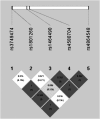CLOCK genetic variation and metabolic syndrome risk: modulation by monounsaturated fatty acids
- PMID: 19846548
- PMCID: PMC2777463
- DOI: 10.3945/ajcn.2009.27536
CLOCK genetic variation and metabolic syndrome risk: modulation by monounsaturated fatty acids
Abstract
Background: Disruption of the circadian system may be causal for manifestations of the metabolic syndrome (MetS).
Objective: The objective was to study the associations of 5 CLOCK polymorphisms with MetS features by analyzing fatty acid (FA) composition from dietary and red blood cell (RBC) membrane sources.
Design: Participants (n = 1100) in the Genetics of Lipid Lowering Drugs and Diet Network (GOLDN) study were included. Dietary intake was estimated with a validated questionnaire. Anthropometric and biochemical measurements and genotypes were determined. Postprandial lipids and the FA composition of RBC membranes were analyzed.
Results: CLOCK single nucleotide polymorphisms were significantly associated with obesity and individual components of MetS. For single nucleotide polymorphism rs4580704, minor allele carriers had a 46% lower risk of hypertension than did noncarriers. The monounsaturated fatty acid (MUFA) content of RBC membranes, particularly oleic acid, changed according to CLOCK genetic variants (P < 0.05). We identified significant gene-diet interactions associated with MetS at the CLOCK locus. By dichotomizing MUFA intake, we found different effects across rs4580704 genotypes for glucose (P = 0.020) and insulin resistance (P = 0.026). The protective effect of the minor allele on insulin sensitivity was only present when MUFA intake was >13.2% of energy. We also found different effects across CLOCK 3111T-->C genotypes for saturated fatty acid intake (% of energy) (P = 0.017). The deleterious effect of gene variants on waist circumference was only found with high saturated fatty acid intakes (>11.8%).
Conclusions: CLOCK polymorphisms interact with FAs to modulate MetS traits. The dietary source and membrane content of MUFAs are implicated in the relations between alterations in the circadian system and MetS.
Figures



References
-
- Garaulet M, Madrid JA. Chronobiology, genetics and metabolic syndrome. Curr Opin Lipidol 2009;20:127–34 - PubMed
-
- Garaulet M, Pérez-Llamas F, Pérez-Ayala M, et al. Site-specific differences in the fatty acid composition of abdominal adipose tissue in an obese population from a Mediterranean area: relation with dietary fatty acids, plasma lipid profile, serum insulin, and central obesity. Am J Clin Nutr 2001;74:585–91 - PubMed
Publication types
MeSH terms
Substances
Grants and funding
LinkOut - more resources
Full Text Sources
Medical
Molecular Biology Databases
Research Materials
Miscellaneous

